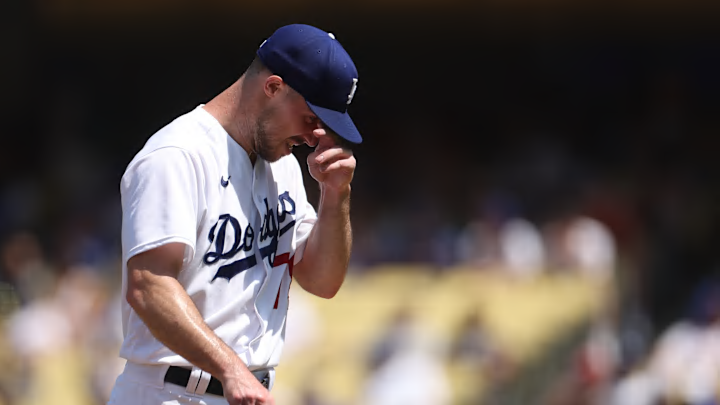OK so ... the Los Angeles Dodgers have one of the worst pitching staffs in the entire league -- not an exaggeration -- but have an offense built to make a deep postseason run, which would make fans think they'd be committed to doing anything productive to improve their rotation and bullpen at this year's trade deadline.
Turns out, after acquiring Kiké Hernandez, Amed Rosario, Joe Kelly and Lance Lynn, the Dodgers were pretty much done adding. They spent almost all of Tuesday -- the day of the trade deadline -- clearing roster spots as they traded Justin Bruihl, Phil Bickford and Adam Kolarek in deals with the Rockies and Mets.
They didn't go hard enough after Justin Verlander, it would seem (though we have a theory on that you'll read about later). They couldn't work out a deal for any of Eduardo Rodriguez (who screwed them), Jack Flaherty, Dylan Cease, James Paxton, Mitch Keller or Brady Singer -- all of whom they were linked to, and all of whom had varying degrees of availability.
Andrew Friedman, the Dodgers' president of baseball operations, is typically calculated when making trades, particularly when there are a lot of bidders and the asking prices are elevated/questionable, but did he take it too far this time around?
All he acquired was cash and pitcher Ryan Yarbrough from the Kansas City Royals. How does this help the 2023 Dodgers, who badly need reinforcements?
The Los Angeles Dodgers and Detroit Tigers had a trade in place for left-handed starter Eduardo Rodriguez, but Rodriguez invoked his 10-team no-trade clause that included the Dodgers and the deal is now dead, sources tell ESPN.
— Jeff Passan (@JeffPassan) August 1, 2023
Dodgers clearly not serious about 2023 after questionable trade deadline
Oh wait, they cleared another roster spot. More trickling in!
The Dodgers traded Eddys Leonard to the Detroit Tigers for cash considerations.
— Los Angeles Dodgers (@Dodgers) August 1, 2023
Anyway, not being able to acquire Cease was understandable. He was one of the few pieces the White Sox didn't want to part with, and it reportedly would've taken a haul to convince them otherwise.
But what about Verlander, who had a majority of his contract paid down by Steve Cohen? Why did they get so deep in talks with the Tigers without having a clue Rodriguez might nix the deal with his no-trade clause? Why didn't they out-bid the Orioles for Jack Flaherty? They couldn't convince the Red Sox to trade James Paxton?
There is growing buzz that the White Sox may trade Dylan Cease in the next 10 minutes, per sources. Dodgers and Orioles seen as favorites if he's moved.
— Mark Feinsand (@Feinsand) August 1, 2023
They somehow ended up with the statistical worst starter in MLB in Lynn, and Yarbrough, who's actually been good as of late but has mostly been conditioned to pitch against offensively-anemic AL Central teams. So how's that going to help?
All the Dodgers did was improve their versatility from a position player perspective as they got out-bid and out-finessed by the more interested buyers.
Dodgers talking to Red Sox about Paxton, still outside chance for ERod, who would need to reverse decision on no-trade, source tells @TheAthletic. Both considered longshots.
— Ken Rosenthal (@Ken_Rosenthal) August 1, 2023
Let's be honest, there probably would've been complaints about bringing in underwhelming arms such as Paxton and Flaherty, but one of those moves would've at least improved the ailing rotation. You'd rather keep trotting Michael Grove out there? You're willingly paying for Lynn?
Eduardo Rodríguez and Jack Flaherty have strong markets, with a little more than 2 hours left to the deadline.
— Jon Morosi (@jonmorosi) August 1, 2023
Dodgers, Braves, Reds, Orioles, Marlins, DBacks all looking at rotation upgrades. @MLBNetwork @MLB
All this talk about the Dodgers not wanting to inherit more salaries in preparation of making a run at Shohei Ohtani this offseason, but they were totally content taking on the money attached to Kelly and Lynn. Kelly's at least a breath of fresh air because of his familiarity with the club, but he hasn't been himself since 2021 and has dealt with elbow issues this year.
#Dodgers making moves on D-Day — Justin Bruihl to Rockies, now Phil Bickford and Adam Kolarek to Mets.
— Bill Plunkett (@billplunkettocr) August 1, 2023
The Dodgers lead the division. They have one of the most potent offenses in the league. They have the prospects to make deals happen. They have the financial flexibility to take on more money or go for the stars.
So why does it feel like they're flushing 2023 down the toilet for the second time? They downgraded in the offseason, which was the first indication. Then, they out-performed expectations to warrant additions at the deadline. But they didn't get that.
What will this season be when all is said and done?
